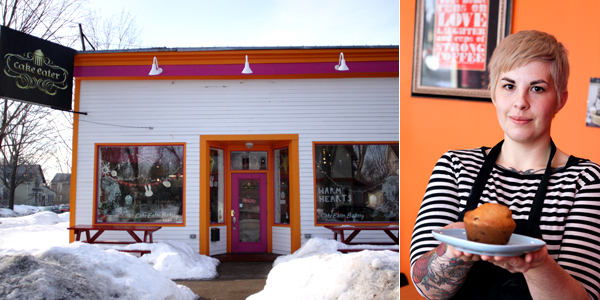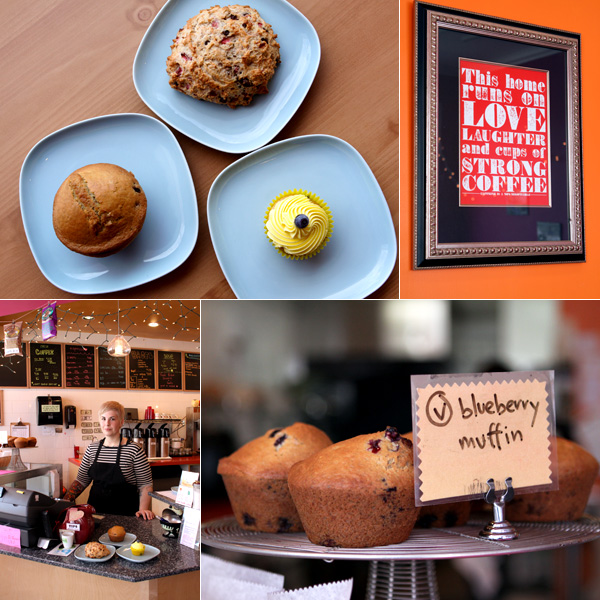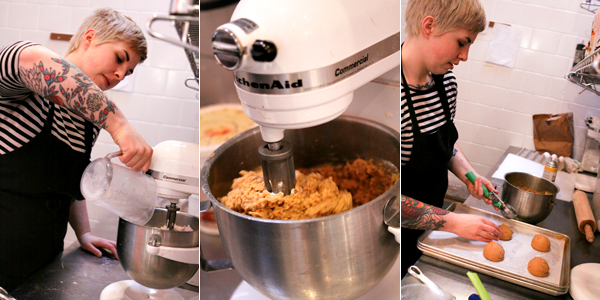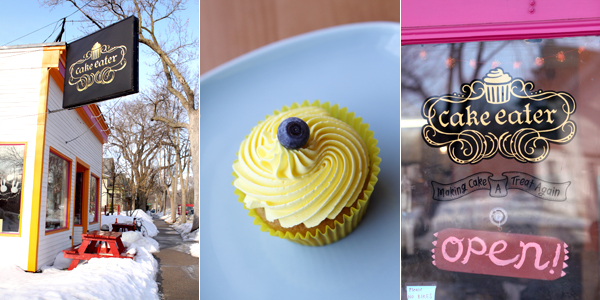
Editor’s Note: Cake Eater Bakery is now closed.
Cake Eater Bakery, located in Minneapolis’ Seward neighborhood, has undergone some major changes since its opening one year ago. The departure of co-owner and chief baker Sheela Namakkal for Chicago’s Bleeding Heart Bakery at the beginning of the year meant that partner Emily Moore Harris has moved from the back office to the kitchen, bringing new recipes and shifting the bakery’s focus from cupcakes to brunch and a wider variety of baked goods. But there’s one constant that Cake Eater fans can count on — the availability of vegan pastries.
“We try to have something for everybody, so that’s where we come in with the vegan treats. And everyone has an allergy today — especially kids. It breaks my heart when a little kid comes in and there’s nothing they can eat. There’s nothing sadder than a sad kid in a bakery!” Harris says. “I try to have a vegan scone or muffin and a vegan cupcake every day. We usually have a vegan soup every day, and we have bagels [from St. Paul Bagelry], which are vegan. We try to have enough in there for the vegans because a lot of people in the neighborhood are vegan.”

A former vegan turned “vegan sympathizer,” Harris takes the kitchen skills she’s honed since she first started cooking at age 14 to create dairy- and egg-free muffins, scones, and cupcakes that mimic the flavor and texture of treats made with animal-derived ingredients. When made with alternative ingredients that retain the level of moisture found in traditional batters or doughs, vegan baked goods have the power to make believers out of people who shudder when the “V” word is mentioned.
“I think a lot of people approach food with this ‘Oh God, gross, vegan!’ attitude. I think they don’t understand what ‘vegan’ really means. It just means there are no animal products in it — it’s not just tofu. There’s a stigma that people who don’t have a lot of exposure to that world will have,” Harris says. “The last two muffins in the bakery will be vegan and people will say, ‘I can’t eat a vegan muffin.’ You usually can’t tell the difference!”
As a baker who typically uses non-vegan recipes as the basis for experimentation, Harris developed several techniques that would help home bakers convert their favorite traditional recipes into vegan treats. Though some trial and error can be expected when adjusting recipes, Harris offers three tips to help speed the process:
1. Beware of excess moisture when using vegan substitutes.
Though soy, almond, or rice milk can often be substituted for cow’s milk on a one-to-one ratio, many egg replacers — such as Ener-G powder or ground flaxseed mixed with water — result in a more liquidy batter or dough. Oil, the most obvious fat alternative to butter, also changes the balance of wet and dry ingredients.
“It’s easy to make vegan batters or dough too wet – the replacement items are often wetter than the original ingredients,” Harris says. “Eggs become just a part of the sugar. But if you put egg replacer in the sugar, you’ll get slime. It turns into something really, really great, but you have to think, ‘Maybe I’ll put [in] a tablespoon more flour and a titch more baking soda.'”
When modifying a recipe, Harris suggests adding flour and baking soda (or another leavening agent) in moderation to prevent the mixture from getting tough. While some doughs, like those for cookies or pies, have a little more room for error, other treats with a more delectable crumb may reach that threshold much sooner.

2. Adjust your oven temperature.
Just as vegan alternatives can add moisture to a batter, these substitutions often bring extra sugars to the recipe. The sugars and starches found in non-dairy milks and egg replacers often make it necessary for bakers to tweak the oven temperature and baking time to prevent the vegan baked goods from scorching.
“If you bake your muffins at 375° for 15 minutes in a traditional recipe, you may have to bake them at 350° for 15-20 minutes for a vegan recipe because [at a higher temperature] those [extra] sugars could caramelize and burn,” Harris says.

3. Get help from the experts.
“Don’t be afraid of vegan cookbooks –- there are some fabulous cookbooks out there. They take the scary out of vegan cooking and make it seem more affordable.” Harris mentions BabyCakes and Veganomicon as two of her favorites.
Of course, if you still prefer to have eggs and butter in your baking repertoire, Harris would be happy to provide when the occasion calls for vegan pastries. Cupcake fans may remember that Cake Eater Bakery’s Vegan Raspberry Lemonade cupcake won top honors in Heavy Table’s local cupcake taste test last spring.
“I love baking and cooking, and I love people telling me about the food. I even like people telling me when they don’t like the food because it helps me make the food better. I’m really open to suggestions — I want us to do the best job we can. I’m often popping my head out and asking ‘How was that thing?’ or passing out samples. Nobody says no to a free cookie!” Harris laughs.

Comments are closed.